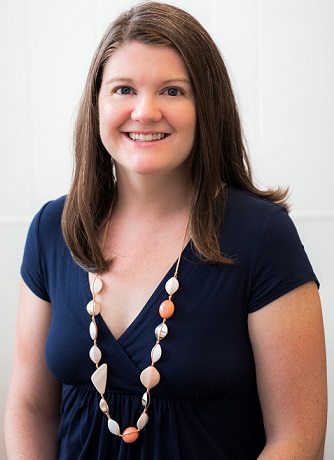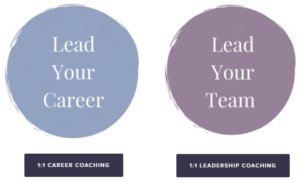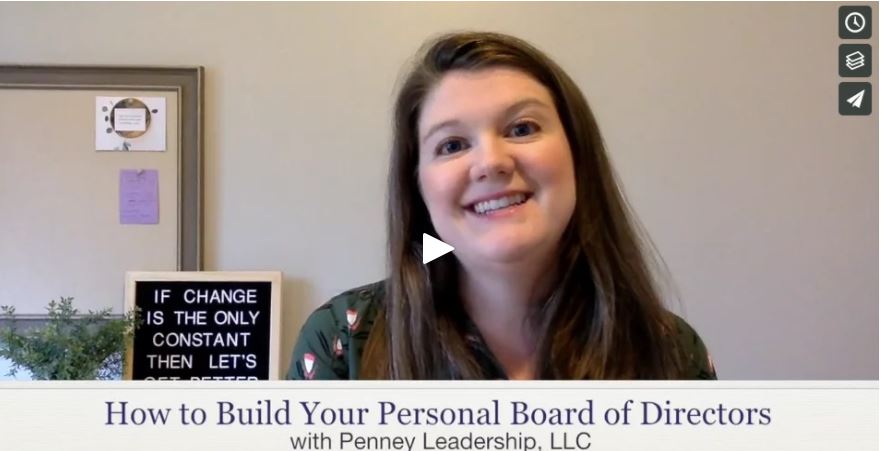Carole Ann Penney is the Founder & CEO of Penney Leadership, LLC. As a Certified Professional Leadership & Career Coach, Carole Ann guides mission-driven professionals to pivot into more meaningful careers and develop their strategic leadership. She came to Rhode Island to earn a B.A. from Brown University, and proudly put down roots here for fifteen years and counting. Through her experience working with fellow leaders in the nonprofit community, Carole Ann identified her purpose of developing the next generation of leaders who will need to solve the grand challenges that face our state (Rhode Island). She works with new & mid-level leaders through one-on-one coaching programs and professional development workshops to help them become more effective managers and ultimately support more impactful organizations.
What is Penney Leadership’s origin story?
At the last organization I worked in, I climbed the ladder through five job titles in seven years. The final position I held was as the organization’s #2: responsible for operations, employee development, and strategic planning and implementation.
As I stepped into that new role, I felt a transition took place—I crossed over some kind of invisible threshold from contributor to Leader with a capital “L.” I was now in a position not just to say that the organization should do this or that, but to actually design and implement meaningful change for a greater impact.
As it turned out, in addition to being an invigorating charge, I also felt the weight of that responsibility settle on my shoulders. I was excited and up to the challenge, but under-trained and under-supported. I couldn’t talk with my co-workers about the challenges we faced in quite the same way; I felt isolated and anxious; I felt pressured to prove myself. I’d be awake at 3 am worrying about how to be an effective leader.
Like many leaders, I developed my management skills on the job. I stretched myself by taking initiatives to lead projects and people, and I pieced together all of the webinars and one-off trainings I could find on topics such as “supervision”, “measuring impact”, and “leadership styles”. But it was impossible to make those experiences add up to something meaningful—to integrate and apply that knowledge in a way that made me a more purposeful, effective, and impactful leader.
I looked up to leaders who shoulder that responsibility every day, wondering “How do they do it?” My driving question became: What does sustainable, authentic leadership look like for me? I wanted to find a better answer to that question than “copious amounts of wine.”
At that point, I had been a Certified Professional Coach with a practice on the side for five years, and so I turned to my coaching tools to uncover the answer.
I sat down and wrote my personal Strategic Leadership Plan, which included my mission, the core values that drive my leadership style, an inventory of my skills and background, my own personal definition of success, and my vision for bringing it all to life. I zeroed in on goals and implementation strategies that would bring these possibilities to life. With my plan in hand, I could articulate clearly what sustainable, authentic leadership means to me: and it starts with heart, curiosity, and purpose.
That process allowed me to finally hear the call of the work I was born to do: develop the next generation of mission-driven leaders. I left my full-time work and launched Penney Leadership, where I work with clients to develop their personal Strategic Plans for career transition and leadership development.
Do you have a favorite quote or mantra that inspires you?
“If change is the only constant, then let’s get better at it.” – Jenny Blake
In today’s job market, we change not just our jobs but our careers more frequently than ever before.
This means that we are all navigating change and uncertainty almost constantly. My goal in working with coaching clients is to help them build what I call “professional resilience”—the kind of confidence that is grounded in a strong sense of who they are, what they stand for, and what they bring to the table. Clients can use this self-knowledge as their personal compass to navigate the career landscape and forge their own paths, since the linear paths of the past no longer exist.
What 3 pieces of advice would you give to young professionals looking to pivot into more meaningful work?
1) Consult the greatest resource at your disposal: yourself. We’ve all been socialized to look for answers externally. When plotting our next steps, we turn to outside resources like the opinions of those around us: books, and leadership and career assessments. We’ve been led to believe that we are all blank slates who can be anything we want to be, and it’s simply not true. You are hardwired with values and talents that drive your interests and skills. It’s not about searching outside of yourself and “finding” your purpose—it’s about giving yourself the space and tools to uncover the you that is already within you. And using that knowledge to guide your decisions, articulate what you bring to the table, and find opportunities that truly align with who you are.
2) Define your skillset. Because we all need to be ready to change not just our jobs but our careers, it’s important not to limit yourself to the degrees and fields listed on your resume. Just because you have a B.A. in Geological Sciences doesn’t mean that’s all you’re good for. Break down everything you’ve done by the skills that you’ve used and developed, and focus on how they can be applied and adapted across industries. When it comes time to write a cover letter or have an interview, you’ll be prepared to make the connections for the hiring manager that communicate why you’re the right person for the job, rather than expecting them to connect the dots on their own (they won’t).
3) Develop your own measures of success. So many of us are going through life trying to live up to a vague and nebulous version of success that keeps us constantly striving, proving, and always falling short. Take the time to sit with this question: “What does success mean to me?” It sounds simple, but it takes some conscious reflection to break apart what’s truly most meaningful and fulfilling for you from what society has conditioned you to believe about success. Writing your personal definition of what success looks like for you allows you to be more honest with yourself about the right next step in your career, and to recognize and celebrate success when you are living it.
What does leadership mean to you? What is a common misconception about leadership?
The word “leader” can be an uncomfortable label to claim. Sometimes when we say it, we imagine that it’s big and formal and in some other realm. It’s for someone other than me—someone who knows what they’re doing.
Many of my coaching clients have shirked the title because they don’t have official direct reports, or the years of experience required to always know how to respond to situations and get it right every time. That’s a common misconception about leadership.
My favorite definition of leadership comes from Marshall Ganz:
“Leadership is taking responsibility for enabling others to achieve purpose in the face of uncertainty.”
By that definition, you can lead in all contexts and all directions—whether that’s overseeing someone a level below you, taking the lead on a project with peers or colleagues, or managing up to guide those who lead you. If we adopt this definition and think of the leadership experience we’ve already been developing as the project manager of the event, or the supervisor of an intern, or the president of our college a cappella group, we stop treating ourselves like babies who may someday, when someone outside of us deems it to be true, become a leader.
We are all already leaders. And our state needs us to step up. Let’s own it.
What does a typical workday look like for you? Do you have a daily routine or ritual that you swear by / that helps you stay focused as you build your business?
One of the reasons why I launched my own business was to integrate my career and motherhood in a way that felt more organic and sustainable. I have a daughter who’s almost three, and we have a great balance between our time baking together, going to story time at the library, and time when mommy is developing her business. While she’s at daycare three days a week, I meet potential clients, tap into my network to learn how I can support local leadership development efforts, and hunker down in my home office to create new content and strategies to establish and grow the business.
I do all my coaching over the phone, so I can work with clients anywhere, and I do most of my coaching after my daughter is in bed. On the days when she’s home with me I get a few things done during nap time, but otherwise enjoy the fact that I can spend time with her now and not feel guilty that I’m not at the office. I get to see her more than the half hour mad dash out of the house in the morning and an exhausted hour at the end of the day! For the first time, parenthood doesn’t feel like a slog.
My favorite daily ritual to keep everything moving forward: I look over my goals for the month and write down three to five steps that I can realistically accomplish today to move me towards the achievement of those goals. Breaking down my larger goals to these smaller steps means that I maintain a sense of momentum and don’t get overwhelmed by larger goals.
How do you help your clients discover their own potential as leaders? What is one step young professionals can take today to discover and develop their own leadership potential?
My role as a coach is not to fix, correct, or advise my clients—I am there to ask big questions and use my extensive toolbox of exercises to help them access the resources within and around them. Each client develops a personal Strategic Leadership Plan: a vision for the leader you are meant to be and the goals and action steps that will help you lead with intention and confidence. The plan includes your personal mission, the core values that drive your leadership style, the unique tools that you carry in your toolbox, your personalized vision for success, and more. Week to week, we develop your goals and advance implementation strategies that will align your actions with your best leadership.
I believe the Strategic Leadership Plan is a powerful tool because it doesn’t just apply to your next steps. It is the foundation of who you are, no matter what changes in your life—whether you’re seeking a new job, you find yourself in a new state, or (hooray!) you’re catapulted to new leadership heights. No matter what circumstances you find yourself in, you’ll feel grounded and confident in what makes you you and what path forward will align best with your guiding principles.
One step you can take now to develop your leadership is to define the values that drive you as a leader. Whether you are conscious of them or not, they are the foundation of your leadership style. New leaders often feel like they’re shooting from the hip or making up their leadership on the fly. Taking the time to bring your values into your conscious awareness means that you can use them as a framework to guide how you approach challenging situations. For example, you can ask yourself: How can I show up to this situation in a way that honors my value of transparency? Whether you are a new or seasoned leader, your values can always be a tool to guide you.
Links:
And I’d love to invite people to subscribe to The Strategic Leader’s Toolbox, a twice-monthly email with practical resources and tools to develop your authentic leadership.
Click here to add your own text






